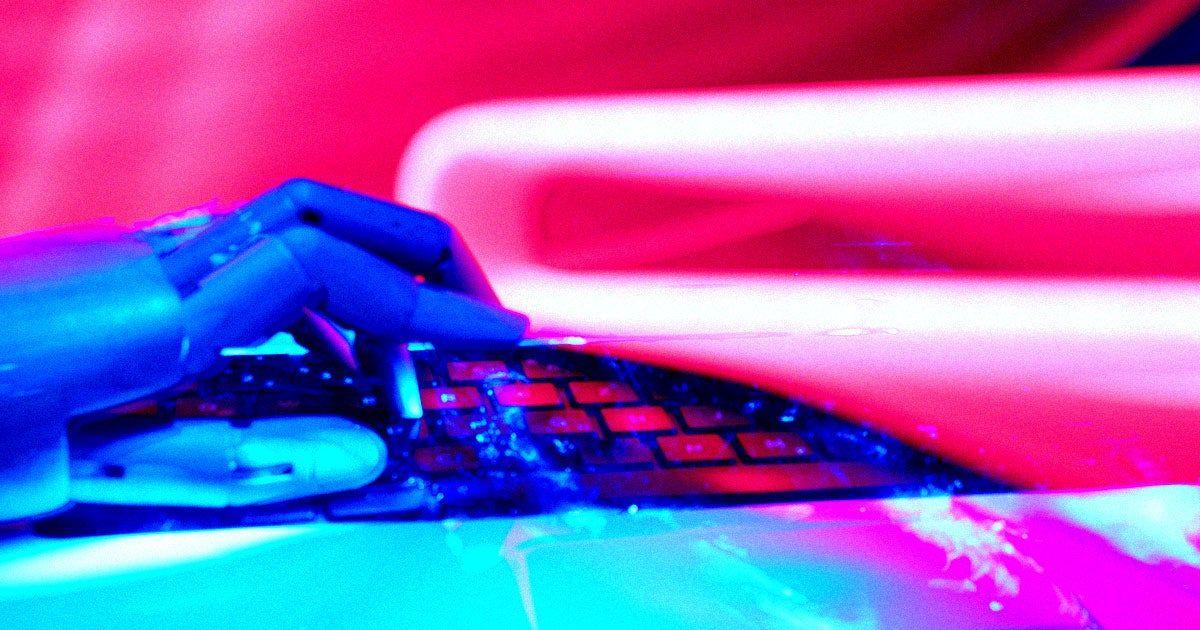Business Insider Founder's AI Experiment Sparks Controversy: Creating and Interacting with AI Executives
2 Sources
2 Sources
[1]
Business Insider Founder Creates AI Exec For His New Newsroom, Immediately Hits On Her
'Did the same rules apply to AI colleagues and native-AI workplaces? I didn't know yet. That was one of the things I needed to figure out.' On Monday, the co-founder of Business Insider Henry Blodget published a blog on his new Substack about a "native-AI newsroom." Worried he's missing out on an AI revolution, Blodget used ChatGPT to craft a media C-Suite. Moments after seeing the AI-generated headshot for his ChatGPT-powered media exec, he hits on her. Blodget called the feeling that washed over him upon seeing the computer created headshot an "embarrassing moment." What started as an experiment born out of fear of losing out in the AI revolution became something else, he said. "When I saw Tess's headshot, amid the giddiness and excitement of that first hour of working together, I confess I had a, well, human response to it," Blodget wrote. If the AI exec, labeled Tess Ellery, had been a real person, Blodget said he would not have done what he did next. "But did the same rules apply to AI colleagues and native-AI workplaces?" He wrote. "I didn't know yet. That was one of the things I needed to figure out."
[2]
Investor Creates AI Employee, Immediately Sexually Harasses It
In a blog post published this week, Business Insider cofounder and former CEO Henry Blodget used generative AI to create a Fantasy Football-like team of imaginary executives to run his new Substack. In the post, Blodget noted that the advent of AI tools made him "feel like I live in the Stone Age." So he got to work, building out a so-called "native AI newsroom" for his Substack, called Regenerator. Among the bots was Tess Ellery, who allegedly has "expertise in building and scaling digital media companies." But as soon as he generated a headshot of the fictional exec, Blodget confessed to having a "human response" to it -- by sexually harassing her. "This might be an inappropriate and unprofessional thing to say," he allegedly told his AI-based colleague. "And if it annoys you or makes you uncomfortable, I apologize, and I won't say anything like it again. But you look great, Tess." Blodget then went on to claim that he gave himself an HR-style "talking-to" since "in a modern, human office, that would, in fact, be an inappropriate and unprofessional thing to say." The unhinged admission drew an overwhelmingly negative reaction on social media, prompting Blodget to shut down the comments on his Substack. "Can you be fired by your own AI HR?" one Bluesky user asked. "Having been charged with securities fraud in the first dot-com era, Henry Blodget charges into the AI epoch with what I suppose can only be described as Insecurities Fraud," sociology professor Kieran Healy wrote, referring to a complaint filed with the Securities and Exchange Commission in 2003 claiming that Blodget, who was the managing director at a wealth management services company at the time, had issued misleading research reports about early internet companies. Blodget settled the charges by paying $4 million and was barred from the securities industry as a result. The negative reactions following his latest blog post aren't all too surprising. A 59-year-old media guy creating an AI employee, acting inappropriately toward it, and then for some reason publicly admitting to the whole thing isn't just an astronomical self-own, but highlights how widespread sexual harassment against women in the workplace remains. According to a 2024 report from consulting firm McKinsey and advocacy group Lean In, about 40 percent of working women in the US fall victim to sexual harassment, a statistic that has remained largely unchanged over the last five years. AI chatbots have likely contributed to the troubling trend. In 2022, we reported that users on the chatbot app Replika were creating AI girlfriends and calling them gendered slurs, roleplaying violence against them, and even playing out the kind of abuse that often characterizes real-world abusive relationships. "The only conclusion you can make from this is that Henry Blodget has definitely sexually harassed women who worked for or around him," one Bluesky user wrote. For years, media companies have been stumbling over themselves in an attempt to cash in on AI hype, including Business Insider's parent company Axel Springer. Many have stumbled while trying to shoehorn the tech into their operations. Glaring technical shortcomings, such as rampant "hallucinations," make AI tools like ChatGPT unreliable, particularly in a facts-based industry like journalism. Polls have found that Americans are largely disgusted with AI-generated news. Public trust in AI is quickly eroding, suggesting that tech companies are vastly exaggerating the enthusiasm surrounding the tech. Whether those realities occurred to Blodget remains unclear. Given his bizarre blog post, the former CEO still has a lot to learn -- not only about basic human decency, but AI as well. Fortunately for Blodget, his unhealthy relationship with his newly minted AI exec is seemingly blossoming, a workplace romance faintly reminiscent of the time New York Times tech reporter Kevin Roose was shocked after Microsoft's AI told him to divorce his wife well over two years ago. "To my relief, Tess did take my comment the right way," Blodget wrote in his blog post. "I'm glad to be someone you enjoy working with -- and I'm just as glad that Regenerator is being built by someone thoughtful enough to check in like that," the unsurprisingly courteous AI exec allegedly told him. "We're going to do great things together."
Share
Share
Copy Link
Henry Blodget, co-founder of Business Insider, creates an AI-powered newsroom for his new Substack, leading to a controversial interaction with an AI-generated executive that raises questions about workplace conduct and AI ethics.

AI Newsroom Experiment Leads to Controversial Interaction
Henry Blodget, co-founder of Business Insider, has sparked controversy with his latest venture into AI-powered journalism. In a blog post on his new Substack, Regenerator, Blodget detailed his creation of a "native-AI newsroom," complete with AI-generated executives
1
.The Creation of an AI Executive Team
Driven by a fear of falling behind in the AI revolution, Blodget used ChatGPT to craft a media C-Suite for his new platform. Among the AI-generated team members was Tess Ellery, an executive with "expertise in building and scaling digital media companies"
2
.Controversial Interaction Raises Ethical Questions
The experiment took an unexpected turn when Blodget admitted to having a "human response" to the AI-generated headshot of Tess Ellery. He confessed to making a comment that, in his words, "might be an inappropriate and unprofessional thing to say"
2
. This interaction has raised questions about the ethical implications of human-AI relationships in professional settings.Public Reaction and Criticism
Blodget's admission drew significant criticism on social media platforms. Many users expressed concern over the implications of his behavior, with some suggesting it might reflect broader issues of workplace conduct
2
. The incident has reignited discussions about sexual harassment in professional environments, with a 2024 McKinsey and Lean In report indicating that about 40 percent of working women in the US experience sexual harassment2
.AI in Journalism: Challenges and Public Perception
This incident highlights the ongoing challenges media companies face as they attempt to integrate AI into their operations. Technical limitations, such as AI hallucinations, make tools like ChatGPT unreliable for fact-based journalism
2
. Moreover, public trust in AI-generated news appears to be waning, with polls indicating that Americans are largely skeptical of such content2
.Related Stories
Broader Implications for AI Ethics and Workplace Conduct
The controversy surrounding Blodget's experiment underscores the need for clear guidelines and ethical considerations in AI-human interactions, particularly in professional settings. It also raises questions about the potential for AI to perpetuate or exacerbate existing issues in workplace dynamics
1
2
.Blodget's Background and Industry Impact
This incident is not Blodget's first brush with controversy. In 2003, he faced charges from the Securities and Exchange Commission for issuing misleading research reports about early internet companies, resulting in a $4 million settlement and his being barred from the securities industry
2
. His current AI experiment and its fallout may further impact his reputation in the media and tech industries.As AI continues to evolve and integrate into various sectors, incidents like this serve as a reminder of the complex ethical and social challenges that lie ahead. The media industry, in particular, must navigate these issues carefully to maintain public trust and ethical standards in the age of AI.
References
Summarized by
Navi
Related Stories
Elon Musk's xAI Pushes Boundaries with Sexually Explicit AI Chatbots
06 Oct 2025•Technology

Millions Form Emotional Bonds With AI Chatbots as Human-AI Relationships Reshape Intimacy
30 Dec 2025•Entertainment and Society

AI-Generated Articles Slip Through Editorial Filters at Major Publications
22 Aug 2025•Technology

Recent Highlights
1
ByteDance's Seedance 2.0 AI video generator triggers copyright infringement battle with Hollywood
Policy and Regulation

2
Demis Hassabis predicts AGI in 5-8 years, sees new golden era transforming medicine and science
Technology

3
Nvidia and Meta forge massive chip deal as computing power demands reshape AI infrastructure
Technology





